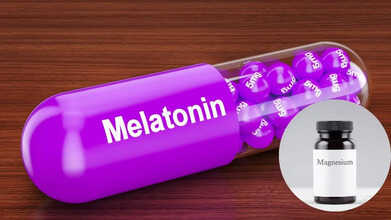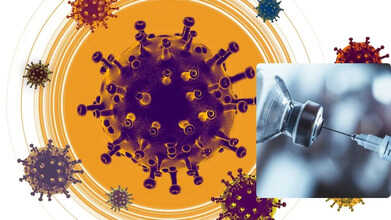- Health Conditions A-Z
- Health & Wellness
- Nutrition
- Fitness
- Health News
- Ayurveda
- Videos
- Medicine A-Z
- Parenting
- Web Stories
How Nutritious Is Jaggery? Should You Switch To Honey?

Jaggery (Credit: Canva)
Jaggery, an unrefined sugar, has been gaining popularity as a "healthy" alternative to refined white sugar. Known by various names globally—such as gur in India, panela in Colombia, and gula Melaka in Malaysia—it is widely consumed as a replacement for artificial sweeteners. Interestingly, honey is another low-calorie product that is closely in competition.
What Is Jaggery?
Jaggery is derived primarily from sugarcane or less commonly, palm sap. Unlike refined sugar, it retains molasses, a nutrient-rich byproduct of sugar production.Traditionally, jaggery is made following three processes. Firstly, juice is extracted from sugarcane or palm. Then impurities are removed by straining the juice. Finally, the juice is boiled down into a thick paste and then cooled into solid blocks, granules, or liquid forms. The colour ranges from light golden to dark brown, with lighter shades often being prized for their purity.
Nutritional Value
Jaggery boasts a better nutrient profile compared to refined sugar due to the presence of minerals like iron, magnesium, and potassium. For example, 100 grams of jaggery provides:- Iron: 11 mg (61% of the RDI)
- Potassium: 1050 mg (30% of the RDI)
- Magnesium: 70–90 mg (20% of the RDI)
However, these benefits come with a caveat- jaggery is still sugar, with a high-calorie content (383 calories per 100 grams). If consumed in modest value, that is a spoon or two, then it yeilds only minimal value.
Potential Health Benefits Of Jaggery
In traditional Indian households, jaggery is consumed after meals to aid digestion. While there is no scientific evidence to confirm this, it is the high sucrose content that could provide the main ingredient.Jaggery contains iron, making it a potential supplement for people with mild iron deficiencies. However, it must not be consumed in high amounts to fulfil one's iron needs.
Although jaggery is often linked to enhanced immune function and liver detoxification, scientific backing for these claims is limited. Jaggery definitely provides a boost to the recovery process as it is high in glucose but relying on it for detox or immunity is not advisable.
Despite its nutrient content, jaggery is fundamentally sugar. Therefore, its overconsumption can lead to health issues such as obesity, heart disease, and type 2 diabetes.
Interestingly, jaggery is versatile in cooking and baking, serving as a natural sweetener in desserts, beverages, and traditional recipes like chakra pongal. Its distinct flavour also enhances savoury dishes, alcoholic beverages, and even natural dyes for fabrics.
Should You Switch To Honey?
Honey is often marketed as a healthier alternative to regular sugar. This is largely due to it being nutrient-dense and having a large number of antioxidants. However, while some claim that it could be a nutritious ingredient, others claim it to be a high-sugar indulgence.High-quality honey is rich in antioxidants like phenolic acids and flavonoids, which combat free radicals and may reduce the risk of chronic diseases and mental health issues. Studies suggest replacing sugar with honey can improve heart health by lowering LDL cholesterol and triglycerides, and increasing HDL cholesterol. Honey also promotes wound healing due to its antibacterial properties, as shown in studies on diabetic foot ulcers. While a healthier alternative to refined sugar, honey is calorie-dense, with 64 calories per tablespoon, potentially contributing to weight gain and blood sugar spikes if consumed excessively. Moderation remains key to reaping its benefits.
Melatonin or Magnesium: Which One Actually Helps You Sleep Faster?

Credits: CANVA
Getting good-quality sleep does more than just help you wake up refreshed—it could also extend your lifespan. A 2023 study found that people who consistently fell asleep easily, stayed asleep through the night, and woke up feeling rested had a significantly lower risk of early death, and were 30% less likely to die from any cause, 21% less likely to have heart disease, 19% lower risk of cancer, and 40% lower risk from other causes.
Given these benefits, it’s no wonder many turn to supplements to improve their sleep. Two of the most popular options are melatonin and magnesium. But which one truly helps you drift into deep, peaceful sleep?
Role of Melatonin In Sleep
Melatonin is a hormone naturally produced by the body that helps signal it’s time to sleep,” says Kenneth Lee, M.D., medical director of the Sleep Disorders Center at UChicago Medicine. According to the Mayo Clinic, melatonin levels rise in the evening when it gets dark and drop in the morning with daylight. “It regulates your circadian rhythm, telling your body when to rest,” adds dietitian Stephanie Crabtree, M.S., R.D.
Melatonin production stays steady through young adulthood but begins to decline after age 40, according to the Cleveland Clinic. That’s one reason melatonin supplements are often studied for older adults. Dr. Lee notes that it can be especially helpful for issues like jet lag, shift work, or misaligned sleep schedules. “If you’re someone who can’t fall asleep until 1 a.m. but need to wake up early, melatonin taken at the right time can help shift your body clock,” he explains.
A 2022 review in Neuroscience & Biobehavioral Reviews found that melatonin helped people with sleep and neurodevelopmental disorders fall asleep faster and stay asleep longer. However, research is mixed for those using it as a general sleep aid. A Sleep Medicine Reviews analysis of 24 studies concluded that melatonin may help some people but is not consistently effective for all.
Side Effects of Melatonin
According to the Mayo Clinic, oral melatonin can sometimes cause headaches, dizziness, or nausea. Less common effects may include mild tremors, anxiety, or confusion. It can also interact with medications such as blood thinners, diabetes drugs, and contraceptives, so it’s important to consult your doctor before use.
How Magnesium Supports Better Sleep
Magnesium is a vital mineral involved in hundreds of body processes, including those linked to rest. “It helps calm the nervous system, relax muscles, and regulate neurotransmitters, which together promote sleep,” says Crabtree. It also supports the body’s natural production of melatonin.
Unlike melatonin, magnesium doesn’t directly trigger sleep but may improve relaxation and reduce nighttime restlessness. “It helps regulate GABA, a neurotransmitter that quiets the brain,” says Dr. Lee. A 2024 study in Sleep Medicine: X found that magnesium L-threonate supplementation improved sleep quality, though the results were based on self-reported data. “In my experience, some patients find magnesium helpful, while others notice little change,” Dr. Lee adds.
Side Effects of Magnesium
According to Dr. Lee, magnesium may cause nausea, diarrhea, or stomach cramps, especially at high doses. The NIH also notes that it can interfere with certain medications, including antibiotics, diuretics, and drugs for osteoporosis or acid reflux.
Melatonin vs. magnesium: Which Is Better?
Research remains inconclusive on which supplement works best. “Melatonin may help if your main issue is falling asleep, or if you’re adjusting to jet lag or shift changes,” says Crabtree. “But magnesium can be more effective for restless nights or tension that keeps you from relaxing. It also supports deep, restorative sleep and can be used safely for longer periods.”
Natural Ways To Sleep Better
Before turning to supplements, experts suggest improving your sleep habits. Dr. Lee recommends:- Practicing good sleep hygiene: Use your bed only for sleep and intimacy, avoid screens or heavy meals before bed, and create a calming pre-sleep routine.
- Trying cognitive behavioral therapy for insomnia (CBT-I): This structured approach helps retrain your mind and body for better sleep.
- Getting screened for sleep disorders: Persistent sleep problems may signal conditions like sleep apnea or restless legs syndrome, which require medical care.
Dietary supplements are meant to complement your diet, not replace medical treatment. They are not designed to diagnose, treat, or cure illnesses. Always consult a healthcare professional before starting any supplement, especially if you are pregnant, breastfeeding, or considering giving it to a child.
Is The ‘Frankenstein’ COVID Variant The Most Vaccine-Resistant Strain Yet?

Credits: CANVA
The Stratus strain, also known as the ‘Frankenstein’ variant, belongs to the SARS-CoV-2 XFG and XFG.3 lineages and has been spreading swiftly across the United Kingdom, with evidence suggesting it is also circulating globally. According to recent data from the UK Health Security Agency (UKHSA), these variants now account for nearly 30 percent of all COVID-19 cases in England, with XFG.3 emerging as the most dominant strain.
In recent weeks, medical experts have voiced concerns that the Stratus variant might have the ability to partially evade immunity built through vaccination, potentially increasing infection risks across all age groups.
What Sets the Stratus or ‘Frankenstein’ Variant Apart?
One of the unusual symptoms linked to this strain is a hoarse or raspy voice, which doctors say was rarely reported with previous variants. “Unlike earlier strains, Stratus carries specific mutations in its spike protein that may allow it to slip past antibodies formed through prior infection or vaccination,” explained Dr. Kaywaan Khan, a Harley Street general practitioner and founder of the Hannah London Clinic.
Is the Stratus Variant More Transmissible?
The XFG or Stratus strain is a member of the Omicron family and is a hybrid of two subvariants, LF.7 and LP.8.1.2. This combination of genetic material helps the virus attach more tightly to human cells, making it potentially more contagious. Like other variants, it also contains several mutations that may enhance its ability to evade antibodies produced either through infection or vaccination.
Could The ‘Frankenstein’ Variant Be The Most Vaccine-Resistant?
Early reports from health authorities suggest that existing COVID-19 vaccines still provide a degree of protection against the Stratus variant. Vaccines designed for earlier strains continue to reduce the risk of severe illness and hospitalization across multiple variants, and experts remain cautiously hopeful that they will do the same against Stratus. However, studies are ongoing to determine how much protection current vaccines actually provide against this specific strain.
As the situation develops, public health recommendations may change. Officials are urging people to follow reliable updates and continue to follow safety advice. Vaccination appointments remain widely available in the UK, and eligible individuals are encouraged to receive their doses or boosters as recommended.
What Are the Symptoms of Stratus?
The most common symptom so far appears to be a sore throat, though overall, the symptoms are similar to those caused by other COVID-19 variants. People infected with Stratus may experience:
- Fever
- Fatigue
- Cough
- Sneezing
- Runny or congested nose
- Nausea, vomiting, or diarrhea
So far, XFG has not been linked to more severe illness compared to previous variants, and hospitalization rates have not shown a sharp increase, which is reassuring.
Why The Stratus Variant Still Deserves Attention
Although it does not appear to cause more severe disease, the Stratus variant is a reminder that COVID-19 continues to evolve. Vaccines remain the strongest line of defense, and researchers are continuing to study how well they perform against this strain. Staying informed through credible sources and following updated health guidance can help limit the spread and keep communities safer.
3 Fertility Truths Every Woman Should Know, According To A Gynecologists

(Credit-Canva)
Infertility impacts millions across the globe, touching both men and women alike. According to the World Health Organization, around 17.5% of the global population, roughly one in six people, experience fertility challenges. This condition can significantly reduce or even prevent natural conception.
Yet, despite its prevalence, infertility remains clouded by myths and misconceptions, many of which unfairly place the blame solely on women. Seeking to debunk these long-held beliefs, Dr. Holly Miller, an American Board-certified obstetrician and gynecologist, took to Instagram to share three important truths every woman should know about fertility.
3 Truths About Fertility Women Should Know
With the help of modern medicine and medical interventions like IVF, fertility treatment can help people boost their chances of reproducing.
Infertility Isn't Just a Woman's Issue
It’s important to understand that infertility affects both partners — it’s not solely a woman’s issue. Blaming only the woman is both unfair and inaccurate. In fact, experts find that the causes of infertility are almost evenly split between men and women.
Roughly one-third of infertility cases are linked to the woman, another third to the man, and the remaining third result from issues affecting both partners — or from causes that doctors are unable to clearly identify.
To identify the cause of infertility, both partners should undergo testing simultaneously. For men, a semen analysis — a quick and straightforward test — is often the easiest and most informative first step.
The "Wait One Year" Rule Changes with Age
Most couples automatically try to conceive for a full 12 months before they think about seeing a fertility doctor. However, the doctor emphasizes that the woman's age is the single most important factor that affects the chances of successful treatment.
If you are under 35 years old: You can safely try for a full 12 months of regular, unprotected sex before seeking a specialist.
If you are 35 or older: You should contact a specialist after only 6 months of trying without success.
If you are 40 or older: You need to see a specialist right away—as quickly as you possibly can.
The doctor explains that after age 35, the woman's egg supply starts to decline more quickly. Time is essential, so couples should strongly ask their doctors for an early referral.
"Unexplained Infertility" Often Means "Undiagnosed Problem"
When a couple is diagnosed with "unexplained infertility," which happens in about 10% to 20% of cases, it means the basic first tests did not find a clear reason. This can be upsetting, but it does not mean you can never have children. In the doctor's experience, the term "unexplained" often means there are hidden problems, such as:
- Small issues with the male partner's sperm that were missed by the basic tests.
- A hidden condition called Endometriosis, which can only be confirmed by a surgical procedure.
- Not having sexual intercourse at the best time or not often enough.
© 2024 Bennett, Coleman & Company Limited

